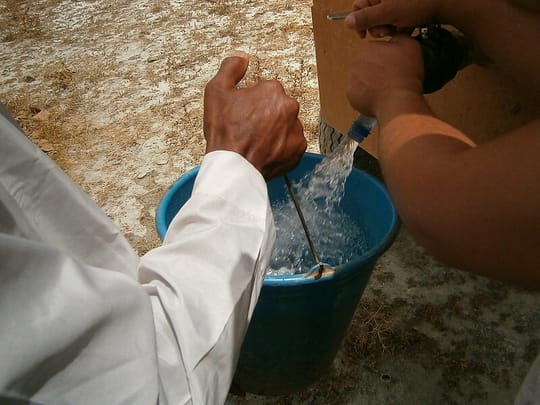Each year on April 7th, World Health Day attracts international attention to the world health issues. This year, the World Health Organization (WHO) highlighted the serious and increasing threat of vector-borne diseases that are affecting millions of people worldwide among the poorest populations, particularly where there is a lack of access to adequate housing, safe drinking water and sanitation. Thus the WHO has called for a renewed focus on vector control and better provision of safe water, sanitation and hygiene.
The Millennium Development Goals (MDGs) have set us on a common course to counter poverty, inequality, hunger and illness. However, despite considerable efforts undertaken to achieve Goal 7 of the MDGs that seeks to halve the proportion of people without sustainable access to safe drinking water and basic sanitation, access to these basic services for rural populations in developing countries remains challenging.
In Morocco, the total water supply coverage in the rural areas is lower than any other region in North Africa. Currently about 40% of rural inhabitants in Morocco do not have access to safe water and about 50% have no access to sanitation. This situation exacts a heavy toll on the health and economic progress of the country. Furthermore, a very high number of the cases of illnesses and death in children are the result of the consumption of contaminated water (many families lose half their children to water-borne diseases).
In addition, women and children bear the primary responsibility for water collection in the majority of households in rural Morocco. In just one day, thousands of work hours are consumed by women and children collecting water for their families. This is time not spent working in an income-generating job, caring for family members, or attending school.
To improve the situation, reforms plus considerable resources and time are needed. The local and national NGOs concerned with issues such as water, sanitation and the environment are important stakeholders working in Morocco to improve the population’s access to safe water and proper sanitation. The High Atlas Foundation (HAF) is a key organization working on improvements through different projects implemented in Morocco, including its current project aiming to bring clean drinking water to five villages in the Tifnoute Valley to the benefit of 1,250 people.
HAF’s water, sanitation and health (WASH) projects have helped provide safe drinking water to many households in combination with increasing hygiene awareness. Thus, such projects have played an important role improving the public access to the proper information about drinking water quality and the water-related risks to human health and have also transferred skills in water-system maintenance and repair.
The cascading positive impact of these actions in improving all aspects of rural livelihoods is noticeable. By reducing considerably the burden of diseases and preventing deaths; by reducing the drudgery of water collection that falls mostly to women and children and freeing up time to concentrate on economic activities and schooling, these actions underpin the attainment of all the Millennium Development Goals, in areas such as infant mortality, poverty reduction, improved health and increased school enrolment rate.
HAF’s contribution to community health improvement also occurs in its projects of installation of toilets and latrines in primary schools, which in addition to the prevention of childhood illness enable children to further their education by entering and remaining in the school system.
In our daily water-rich life we may take water for granted, but in parts of Morocco, access to clean water is a matter of life or death. Safe drinking water is fundamental to health, survival, growth and development, and for that reason we should consolidate and continue efforts to ensure the generalization of the access to this vital resource in all the regions of Morocco.
